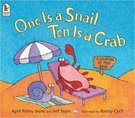Picture book maths
Add to My Folder
It is essential to instil a love of mathematics in children of all ages. To avoid the wails of despair – “I can’t do maths”, “I am rubbish at maths”, “Maths is too hard” – that can often be heard flowing from adults and children alike, it is essential to kindle this love of mathematics from an early age. As Nicki Allman has outlined in her fantastic article, one way to do this is with picture books.

Picture books can provide a fun and engaging stimulus for mathematical thinking, especially when introduced as part of whole-class or even smaller-group activities. They can also help to introduce new concepts to children during a relaxing and fun part of their day.
Picture books provide an essential tool for use both at home and in the classroom. Within Early Years settings, these types of books can be found on many bookshelves as well as in story areas. They often form part of a story-time period where all can take enjoyment from sharing a book. This is often ‘chill-out’ time where children can interact in a fun and enjoyable way. Who doesn’t like listening to a story? It helps to develop listening skills as well as speaking skills, which are essential components for developing reading and writing skills.
However, picture books can also be a useful prompt for mathematical discussion in a non-threatening and relaxed environment. This ‘chilled-out’ atmosphere helps with the introduction of and engagement with new or tricky concepts. Story-time with picture books enables the development of talk and the exploration of a concept through discussion.
Picture books fall into distinct groups from a maths perspective
1) There are books specifically written with a mathematics focus to enable direct teaching of different mathematical concepts such as number sense, counting, addition etc… Such books can be used directly to teach a particular concept. They often have a repeated focus to enable children to engage. Even the less confident child will be able to work within a repeated framework. E.g. One is a Snail, Ten is a Crab by April Pulley Sayre and Jeff Sayre and Each orange had 8 slices by Paul Gigantii Jr and Donald Crews
Scholastic Resource Bank: Early Years - join today!
- Over 2,000 EYFS resources, activity ideas and games
- Perfect for anyone working or playing with children from 0 to 5 years old
- Unlimited access from just £1.25 per month
Already a member? Sign in below.
Published 1 June 2016
Reviews
You need to be signed in to place a review.
